I wondered why the doctor was talking so freely, now, in contrast with his former secretiveness.
“Do you think he was right?” shot out Kennedy quickly, eying Dr. Ross keenly.
“No, emphatically, no; he was not right,” replied the doctor, meeting Craig’s scrutiny without flinching. “Mrs. Maitland,” he went on more slowly as if carefully weighing every word, “belongs to a large and growing class of women in whom, to speak frankly, sex seems to be suppressed. She is a very handsome and attractive woman—you have seen her? Yes? You must have noticed, though, that she is really frigid, cold, intellectual.”
The doctor was so sharp and positive about his first statement and so careful in phrasing the second that I, at least, jumped to the conclusion that Maitland might have been right, after all. I imagined that Kennedy, too, had his suspicions of the doctor.
“Have you ever heard of or used cobra venom in any of your medical work?” he asked casually.
Dr. Ross wheeled in his chair, surprised.
“Why, yes,” he replied quickly. “You know that it is a test for blood diseases, one of the most recently discovered and used parallel to the old tests. It is known as the Weil cobra-venom test.”
“Do you use it often?”
“N—no,” he replied. “My practice ordinarily does not lie in that direction. I used it not long ago, once, though. I have a patient under my care, a well-known club-man. He came to me originally—”
“Arnold Masterson?” asked Craig.
“Yes—how did you know his name?”
“Guessed it,” replied Craig laconically, as if he knew much more than he cared to tell. “He was a friend of Mrs. Maitland’s, was he not?”
“I should say not,” replied Dr. Ross, without hesitation. He was quite ready to talk without being urged. “Ordinarily,” he explained confidentially, “professional ethics seals my lips, but in this instance, since you seem to know so much, I may as well tell more.”
I hardly knew whether to take him at his face value or not. Still he went on: “Mrs. Maitland is, as I have hinted at, what we specialists would call a consciously frigid but unconsciously passionate woman. As an intellectual woman she suppresses nature. But nature does and will assert herself, we believe. Often you will find an intellectual woman attracted unreasonably to a purely physical man—I mean, speaking generally, not in particular cases. You have read Ellen Key, I presume? Well, she expresses it well in some of the things she has written about affinities. Now, don’t misunderstand me,” he cautioned. “I am speaking generally, not of this individual case.”
I was following Dr. Ross closely. When he talked so, he was a most fascinating man.
“Mrs. Maitland,” he resumed, “has been much troubled by her dreams, as you have heard, doubtless. The other day she told me of another dream. In it she seemed to be attacked by a bull, which suddenly changed into a serpent. I may say that I had asked her to make a record of her dreams, as well as other data, which I thought might be of use in the study and treatment of her nervous troubles. I readily surmised that not the dream, but something else, perhaps some recollection which it recalled, worried her. By careful questioning I discovered that it was—a broken engagement.”




